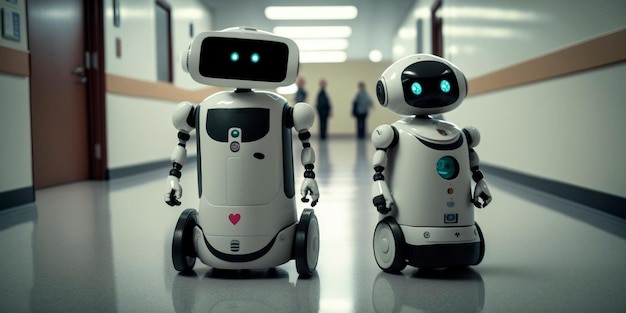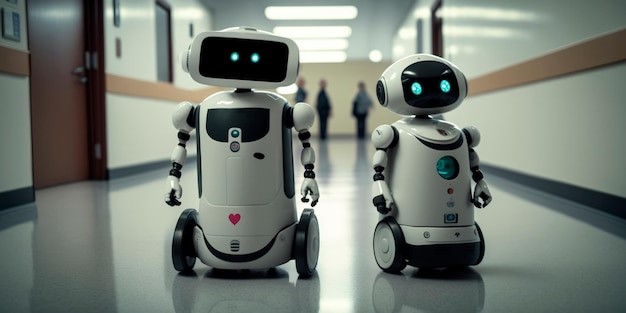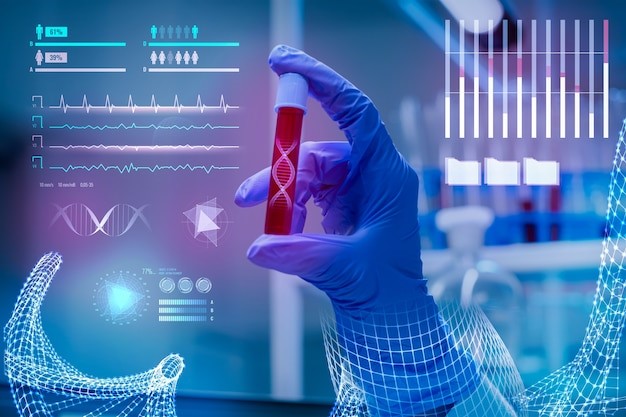
With a rise in data and increasing demand for clinical services, AI is increasingly applied in the field of healthcare. These technologies have great potential to transform many aspects of healthcare as well as administrative processes.
This article will focus on the functions of AI in healthcare, and how AI is transforming patient care.
There are various types of AI relevant to healthcare. Different types of AI technologies bring distinct capabilities to enhance healthcare services.
Machine learning includes the development of algorithms that enable computers to learn from and make decisions based on data. Inspired by the human brain, machine learning has developed an advanced subset based on artificial neural networks (ANNs). Deep learning uses multiple layers of neural networks to extract higher-level features from the raw data. This technology is revolutionizing the detection and treatment of diseases.
NLP focuses on the interaction between computers and human languages. After being trained by speech recognition datasets and other textual data, its applications include speech recognition, translation and text analysis. In healthcare, NLP understands clinical notes and medical records, prepares reports, and transcribes patient interactions. This technology enhances communication between patients and doctors, and ensures that patients receive clear information about their health.
Rule-based expert systems are an older generation of AI. They were dominant in the 1980s. They can provide healthcare professionals with clinical decision support based on a lot of medical knowledge. By following predefined rules, these AI systems can suggest diagnoses, recommend treatments, and alert clinicians to potential drug interactions or contraindications.
RPA does not really involve robots. It uses computer programs to automate repetitive tasks. In healthcare, RPA can streamline many back-office functions. By automating routine tasks, healthcare organizations can improve efficiency and reduce the risk of human error.
By integrating AI algorithms with diagnostic services, healthcare organizations are facilitating faster diagnoses and treatment decisions that improve patient outcomes. AI algorithms can assist radiologists in analyzing X-rays and MRI scans, and they can help oncologists determine the best treatment for cancer patients based on genetic data.
Physical robots in healthcare are mainly used for assistance in surgical procedures and patient care. They can perform pre-defined tasks like lifting, repositioning, and delivering supplies in hospitals. They are also capable of executing complex tasks that may be challenging for humans. In surgery, surgical robots can lead to less invasive procedures, reduced blood loss, and quicker patient recovery times.

Patient interaction and experience are crucial for human-oriented modern healthcare. AI has explored new avenues for enhancing these aspects.
1. 24/7 Access to Healthcare Information
Virtual nursing assistants and chatbots offer patients a brand new level of accessibility. They can provide immediate responses to patient queries at any time. Such constant availability can alleviate patients' anxiety when waiting.
2. Routine Inquiries
Routine inquiries consume a large portion of the clinical staff's time. AI-powered chatbots and virtual nursing assistants can help healthcare professionals focus on more complex patient care. This way can also improve the efficiency of healthcare operations.
1. Tailored Treatment Options
AI can provide tailored treatment options for each patient, as it can quickly analyze vast amounts of data. It measures one's medical history, genetic data, as well as lifestyle, and then makes personalized treatment plans.
2. AI-Assisted Interactions
Healthcare providers and patients have to work together to make informed decisions about treatment options. AI-assisted interactions can advance this process. AI will present patients with relevant information, potential outcomes, as well as the risks and benefits of different treatment plans.
To deliver high-quality patient care, effective healthcare operations and workflows are important. AI technologies streamline these processes so that improve patient experiences.
1. Automating Paperwork and Record-Keeping
Traditional healthcare systems have been dragged down by paperwork and manual record-keeping. AI-powered automation tools can digitize medical records and simplify administrative processes. This not only cuts off the data entry time but also minimizes the risk of human error.
2. AI-Assisted Coding and Billing Processes
AI algorithms can analyze clinical documentation to assign the correct codes, ensuring compliance with billing standards. This also helps healthcare organizations to avoid costly errors and delays in reimbursements.
Being good at sifting through vast amounts of datasets, AI systems analyze insurance claims against a backdrop of historical data and known fraud schemes. After that, they can flag suspicious claims for further investigation. As they can detect and prevent fraud effectively, AI technologies can reduce the financial burden on patients and the overall healthcare system.
1. Deep Learning for Cancer Risk Prediction
By employing deep learning algorithms, researchers have been able to enhance the prediction of cancer risks. This AI-driven approach can analyze medical images with more details and quicker speed, bringing more accurate diagnoses.
2. Hybrid Human-AI Models
Hybrid human-AI models are there to produce the best results, particularly in many identifying conditions. This approach takes the strengths of both humans and AI. That is why it brings enhanced diagnostic accuracy and more informed clinical decisions.

1. Analyzing Large Datasets
The sheer volume of data generated in healthcare is overwhelming for human analysts. AI can process and analyze large datasets that enable clinicians to make more personalized decisions about patient care.
2. Predictive Analytics for Patient Outcomes
Predictive analytics allows healthcare providers to forecast patient outcomes based on historical data and trends. This way enables clinicians to tailor treatments to individual patients, anticipate their specific needs, and adjust care plans.
1. Tracking Health Data in Real-time
Nowadays, wearable devices and health apps have innovated. Health data is collected and analyzed by them. With sensors and AI algorithms, these tools provide continuous monitoring of vital signs. From heart rate to blood pressure, they collect the data in real-time and offer guidelines to users, leading them to healthier lifestyles.
2. Early Detection and Prevention of Chronic Diseases
There isn't enough time for healthcare providers to support all chronic care while detecting health issues at early stages is critical in managing and preventing chronic diseases. AI-enhanced health monitoring can find out subtle changes in a patient's health parameters. This system will take preventive measures in time, avoiding the progression of diseases like diabetes and heart disease.

1. Monitoring Infectious Diseases
COVID-19, Tuberculosis, and Malaria are all infectious diseases. By analyzing data from various sources, AI can accurately trace the spread of infectious diseases. This way, AI can support health authorities to identify hotspots, predict outbreaks, and implement targeted interventions.
2. Rapid Response to Public Health Emergencies
Public health emergencies require a swift response to mitigate their impact. AI’s real-time analytics provide decision-makers with necessary information to allocate resources effectively, develop targeted interventions, and communicate risk to the public. This can save lives, reduce the burden on healthcare systems, and minimize the economic as well as social disruption.
In the healthcare industry, drug development and safety are critical components. Today, AI is playing an increasingly vital role in enhancing them.
1. Detecting and Reporting Adverse Drug Effects
Pharmacovigilance pays attention to the detection, assessment, understanding, and prevention of adverse effects or other drug-related problems. AI technologies automate the process of detecting and reporting adverse drug reactions. Given the data of clinical trial results, patient records, and social media, AI analyzes them and identifies potential safety concerns.
2. Enhancing Drug Safety through AI and Automation
The integration of AI and automation in drug development expedites the detection of adverse drug effects and enhances overall drug safety. Adding AI to this process helps to eliminate potential safety issues, reducing the risk of harm. Enhanced safety allows companies to develop safer drugs and improve patient outcomes.
1. Reducing the Costs of Drug Discovery
Traditional processes of drug discovery are time-consuming and expensive. These require laboratory testing and trial-and-error approaches. Supported by AI, high-fidelity molecular simulations offer an alternative in a cost-effective way. These simulations allow scientists to model and predict the behavior of drug molecules without extensive physical testing.
2. Predicting Drug Toxicity and Efficacy
AI-driven molecular simulations can analyze the properties of drug therapeutic benefits and adverse reactions. This capability enables researchers to identify promising drug components and eliminate those with unacceptable safety. Hence, it accelerates the development of safe and effective treatments.

While there are benefits, there are concerns. Healthcare has been an exclusive area for humans in the past. The applications of AI in healthcare raise questions about bias, transparency, and privacy. These questions are inevitable, so we must figure them out and maintain public trust.
1. Bias
AI systems are trained on data that may reflect inequalities or prejudices. So, there are potential biases in AI systems. From misdiagnoses to unequal treatment recommendations, bias will appear in various ways, and some of them are even invisible. To overcome this, AI systems require more data input, just like what humans do to expand their horizons. Through diverse and multimodal datasets, rigorous testing, and continuous monitoring, AI systems can operate fairly for all patients.
2. Transparency
Transparency in AI should clearly show how decisions are made and builds trust among healthcare providers and patients. It leads users to understand the basic logic behind AI-driven recommendations. This can foster patient's trust and confidence in AI technologies.
3. Privacy
Privacy is particularly sensitive in healthcare. Ensuring that AI systems are designed with privacy in mind is a key aspect of AI governance. AI systems often manage vast amounts of personal health data. That's why it is necessary to take stringent privacy measures to protect patient information.
The advancement of AI in healthcare needs the establishment of ethical and regulatory frameworks to guide its development and application. The World Health Organization (WHO) has developed guidelines to govern the use of AI in healthcare.
1. Protect Autonomy
AI governance must ensure that AI systems support individual decision-making and that patients retain control over their personal health data.
2. Promote Human Safety and Well-being
AI systems should be rigorously tested and proved to be safe before they are deployed in clinical settings. By this, they can ensure human safety and well-being.
3. Ensure Transparency and Intelligibility
As mentioned above, transparency is the key to building public trust. This principle emphasizes the need for clear communication about how AI systems work, their limitations, and the basis for their decisions.
4. Foster Accountability
Clear accountability draws lines for AI governance. There should have clear lines of responsibility for the development, deployment, and impact of AI systems in healthcare.
5. Ensure Equity
Equity prevents AI systems from exacerbating existing health disparities. AI governance must promote the fair distribution of AI benefits and ensure that all patients have access to AI-enhanced healthcare services.
6. Promote Responsive and Sustainable AI
AI should be designed to be responsive to the needs of patients and the healthcare system, and sustainable in their operation. This ensures that they can be improved over time without causing burden on healthcare resources.
We are facing a new era in healthcare. The innovation and development of AI will definitely redefine the healthcare industry.
Pushed forward by breakthroughs in ML, NLP, and other fields, AI tools will be able to tackle more and more complex tasks. They assist with routine administrative duties and aid in the interpretation of complex medical data. The development of these tools not only improves the efficiency of healthcare operations but also enhances the quality of patient care.
Moreover, the integration of AI into wearable devices will bring a new trend of personalized medicine. The future will likely see AI tools that can predict health risks before materializing and offer preventative care strategies to meet individual needs.
AI's potential to augment clinical work is one of the most exciting prospects for the future in healthcare. It can free healthcare professionals to focus on the activities that require human empathy, interaction, and expertise. This augmentation improves the efficiency of clinical work and leads to more satisfying experiences for both patients and healthcare providers.
Furthermore, the potential for AI is endless to improve surgical outcomes, optimize medication regimens, and prevent complications. We can fully use AI's ability to analyze vast amounts of data and identify differences that humans might ignore. With this, AI can bring more accurate diagnoses for doctors and patients.
In the future, we may see AI playing a critical role in telemedicine and remote care. The development of AI-powered chatbots and virtual health assistants has already been able to offer 24/7 support and even initial consultations. After that, they are capable of bridging the gap for patients in remote areas and providing them with high-quality healthcare services.